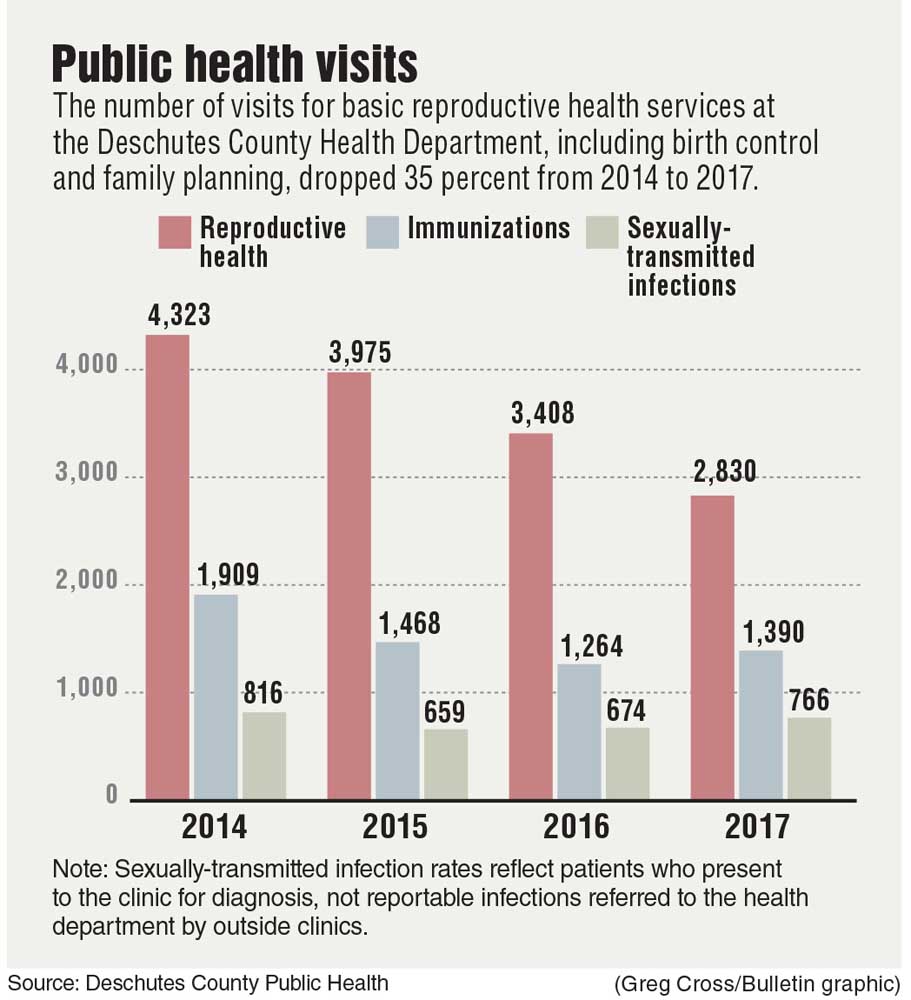Deschutes considers dropping reproductive health
Published 12:00 am Wednesday, February 28, 2018

- Deschutes considers dropping reproductive health
The Deschutes County Health Department is considering whether to recommend an end to birth control and family planning services at its Bend, Redmond and La Pine clinics, sending patients to private clinics in the region instead.
The health department experienced a 35 percent drop in the number of reproductive health visits from 2014 to 2017, after the passage of the Affordable Care Act and other health reforms increased insurance coverage in the county.
Trending
“As our numbers of patient visits have gone down, the program has struggled to provide services in a cost-effective manner,” Deschutes Public Health Deputy Director Hillary Saraceno said. “You come to a point where you have to make some hard decisions.”
The move became an option after the passage last year of Oregon House Bill 3391, which requires insurance to cover abortions, contraception and other reproductive health services at no cost to patients. The law also expanded the type of clinics that could receive state funding for reproductive health services.
“We had been the sole receptor (in Deschutes County),” Saraceno said. “HB 3391 changed that. It creates more options for access for our clients because more providers will be eligible to receive that state funding.”
Saraceno stressed that the question is still being discussed internally, and no decision had been made. Health officials are in the middle of assessing the needs of the community and the services they provide as they prepare their budget for the next fiscal year starting July 1.
Staff will make a recommendation on their reproductive health services to the health director and county administrators, who must then decide whether to take that recommendation to the Deschutes County Commission. Commissioners would make any final decision on whether or not to cut the program.
“It’s certainly not a recommendation or a decision that we would take lightly,” Saraceno said. “Our primary concern is always going to be our clients and ensuring that their preventive health care needs are being met.”
Trending
But county officials are wavering about closing down the clinic because of the uncertainty about the future of the Affordable Care Act.
“Starting up a clinic after closing it would be horrible,” Saraceno said.
In 2017, the Deschutes County Health Department saw 1,634 reproductive health visits at its Bend clinic, another 1,118 in Redmond and 78 in La Pine.
Cutting reproductive health services would allow the health department to shift funds toward other needs, including more work on preventing sexually transmitted infections, which have been increasing in Central Oregon for a number of years. Saraceno said the department would not cut funding for its immunization or sexually transmitted infection work, and could enhance those programs if it saves money by eliminating reproductive health.
“We’re having to subsidize the clinic more and more, and this was sort of the tipping point,” she said. “How far do we subsidize this at the expense of some other things?”
The Oregon Health Authority expects county health departments to ensure that everyone has access to reproductive health services, but does not require them to provide it themselves.
“Some local public health authorities have looked at ways to utilize providers in the community to deliver reproductive health services, rather than having the local public health authority deliver services,” said Jonathan Modie, an agency spokesman. “We are currently not seeing evidence to suggest that many local public health authorities will cease providing services.”
A number of other county health departments in Oregon have already discontinued or are considering ending family planning services. Washington County, which includes Beaverton and Hillsboro, closed its clinic in 2015, and partnered with other safety net organizations that provide those services.
“It’s been a process, but we have great community partners that have worked really hard to make sure that people aren’t falling through the gaps,” said Wendy Gordon, a spokeswoman for the Washington County Health Department. “There was pushback from the community. They didn’t quite understand it. But our model has always been to contract services. We’re really not direct providers.”
That might be more of an option in more populated counties that have a higher number of alternatives. Health officials in Crook and Jefferson counties said they will continue to provide reproductive health services themselves.
“There just are not that many options locally, in comparison to Deschutes County, for these services,” Jefferson County Health Director Michael Baker said. “When we do a quick review, we actually see potential for an increase in our funding for the services we provide.”
Deschutes County Health officials have been contacting other clinics in the region, including Planned Parenthood’s Bend Health Center, to gauge their ability to absorb the additional patients.
“The Bend Health Center is ready to serve them,” said Jimmy Radosta, spokesman for Planned Parenthood Columbia Willamette.
—Reporter: 541-633-2162, mhawryluk@bendbulletin.com
Editor’s note: This article has been corrected. An earlier report misstated the percentage drop in number of reproductive health visits to the health department from 2014 to 2017. The Bulletin regrets the error.








